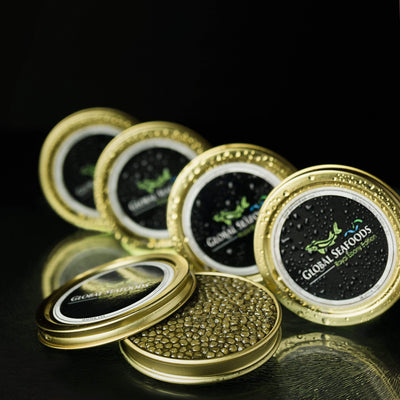The Ethics of Sturgeon Caviar: Sustainable Luxury and Conservation

Sturgeon Caviar: Balancing Luxury
For centuries, sturgeon caviar has symbolized opulence, culinary excellence, and indulgence. However, with the dramatic decline in wild sturgeon populations due to overfishing and habitat loss, the production and consumption of sturgeon caviar have come under scrutiny. Today, ethical and sustainable practices are at the forefront of the caviar industry, offering a way to enjoy this delicacy responsibly.
This article explores the ethical challenges and solutions surrounding sturgeon caviar, providing insights into sustainable practices and the role of consumers in shaping the future of this luxurious treat.
Understanding the Ethical Concerns of Sturgeon Caviar
1. Overfishing and Habitat Loss
Sturgeon, an ancient species dating back over 200 million years, has faced severe population declines. According to the World Wildlife Fund (WWF), 85% of sturgeon species are now critically endangered due to:
- Overfishing: Unregulated harvesting for caviar in the 20th century depleted wild stocks.
- Habitat Destruction: Dam construction and pollution have destroyed vital breeding grounds.
2. Traditional Caviar Harvesting
Traditional methods of extracting caviar often involve killing the sturgeon, which raises ethical concerns about animal welfare and conservation.
3. Black Market and Illegal Trade
The high value of sturgeon caviar has fueled a black market that threatens wild populations. Unsustainable and illegal fishing practices undermine conservation efforts and flood the market with unregulated products.
How the Industry Is Addressing Ethical Concerns
1. Sustainable Aquaculture
One of the most significant advancements in the caviar industry is the rise of sustainable sturgeon farming. Modern aquaculture methods allow for:
- Controlled Breeding: Protecting wild populations by farming sturgeon in regulated environments.
- Non-Lethal Harvesting: Techniques such as "striping" extract eggs without harming the fish, enabling repeated harvesting throughout their lifespan.
2. Certification and Transparency
Organizations like CITES (Convention on International Trade in Endangered Species) regulate the international trade of sturgeon caviar. Look for products with CITES certification to ensure they meet ethical and legal standards.
Explore sustainable caviar options:
Sustainability Efforts in Sturgeon Caviar Production
1. Eco-Friendly Farming Practices
Sustainable caviar farms prioritize:
- Water Recycling: Reducing environmental impact by minimizing water waste.
- Natural Diets: Feeding sturgeon a diet free from harmful chemicals.
- Low-Impact Facilities: Avoiding pollution and protecting surrounding ecosystems.
2. Non-Lethal Caviar Harvesting
Advancements in non-lethal harvesting techniques, such as hormone-induced egg release, ensure that sturgeon can live for decades while continuing to produce caviar.
3. Consumer Awareness and Education
Educated consumers play a critical role in supporting ethical practices by choosing sustainably farmed products.
Learn more about ethical caviar on our Global Seafoods YouTube Channel.
How to Choose Ethical Sturgeon Caviar
1. Check for Certifications
Ensure the caviar you purchase has CITES certification or other sustainability labels.
2. Purchase from Reputable Vendors
Trusted retailers like Global Seafoods offer authentic, sustainably sourced sturgeon caviar.
3. Avoid Suspiciously Cheap Products
High-quality sturgeon caviar is expensive to produce. Low prices often indicate illegal or unethical harvesting practices.
4. Support Non-Lethal Options
Opt for caviar from farms that use non-lethal harvesting methods.
Explore our premium selection:
Why Ethical Sturgeon Caviar Is Worth the Investment
1. Quality Assurance
Sustainably farmed caviar often surpasses wild-caught caviar in quality, offering consistent flavor and texture.
2. Supporting Conservation
By choosing ethical caviar, you contribute to the protection of sturgeon species and their ecosystems.
3. Enjoying Luxury Responsibly
Ethical sturgeon caviar allows consumers to indulge in this delicacy without guilt, knowing it was produced responsibly.
The Future of Ethical Sturgeon Caviar
The shift toward sustainability in the caviar industry is gaining momentum, with innovations in farming techniques and increasing consumer demand for ethical products.
Emerging Trends
- Technological Advancements: Improved non-lethal harvesting methods.
- Consumer Awareness: Growing interest in sustainable luxury foods.
- Expanded Certification Programs: Ensuring transparency and accountability across the industry.
Common Myths About Ethical Sturgeon Caviar
1. Myth: Ethical caviar is too expensive.
Fact: While it may cost more upfront, the investment supports sustainable practices and offers superior quality.
2. Myth: All caviar is harvested lethally.
Fact: Many farms now use non-lethal methods to harvest caviar sustainably.
3. Myth: Sustainable caviar lacks flavor.
Fact: Ethical caviar farms produce some of the finest, most flavorful caviar on the market.
Conclusion: The Path to Sustainable Luxury
The journey of sturgeon caviar from an endangered delicacy to a beacon of sustainable luxury reflects the growing importance of ethical consumption. By supporting responsible farming practices and purchasing from reputable sources, you can enjoy the exquisite flavors of sturgeon caviar while contributing to the preservation of this iconic species.
Ready to make an ethical choice? Explore our collection of sustainably sourced caviar and indulge in guilt-free luxury:
Also in News

How to Make Sea Bream Sushi With Dry-Aged Tuna & Crab Roll — Step-by-Step With Chef Joshua
A complete guide to making Sea Bream sushi at home, including filleting, curing, slicing, and building a Dry-Aged Tuna & Crab sushi roll. Chef Joshua shares professional tips for restaurant-quality results.

Cooked Crab for Game Night: Everything You Need for a Perfect Seafood Party
Take your game night to the next level with a Cooked crab party. Learn the best recipes, cooking tips, and hosting hacks for a memorable seafood feast.

Steam Crab for Date Night: A Romantic Guide to the Perfect Seafood Feast
Make your next date night unforgettable with a romantic Steam crab experience. This guide covers everything you need to know, from ambiance to the best crab varieties.

